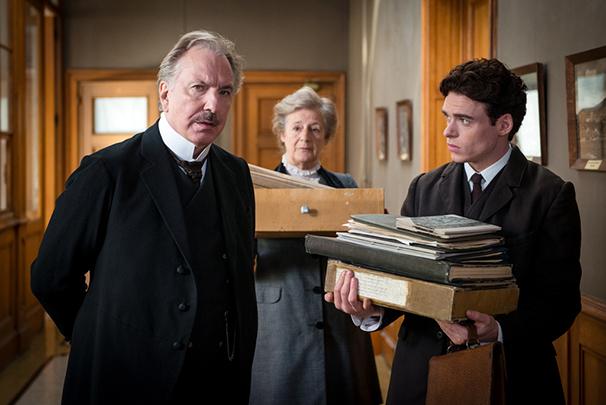
The cinematic love story has a long history of being a hit or miss with audiences. Whether indie- or studio-financed, these types of films will generally gather an audience due to the market for the genre. Although “A Promise,” directed by Patrice Leconte, gives audiences the love story they crave, the rest of the film falls flat due to writing and editing techniques that do not support the film in the ways they should.
“A Promise” is the story of Friedrich Zeitz (Richard Madden), a young man who comes to work for Karl Hoffmeister (Alan Rickman) at his family-owned steel company. As Karl’s health declines, he begins to entrust his business to Zeitz, who has proved himself a worthy protégé.
Friedrich makes regular trips to Karl’s home, where he meets his employer’s significantly younger wife, Lotte (Rebecca Hall). Friedrich and Lotte fall in love, but must face several obstacles before they can be together.
Although the narrative appears to be straightforward, the editing transitions between scenes are too abrupt, throwing the viewer from one plot development to another too quickly and never letting them register with the audience.
“A Promise” only focuses its narrative on the tension between the two young lovers, a story that is transparent and plain. The plot is only used for building the relationship between Friedrich and Lotte when it could have been so much more — since the film is set right before World War I in Germany, the undertones of unrest and discord within the country should have been more apparent, especially in the life of a man who runs a steel business.
Lotte is the strongest character of the film. Since both men love her, the story takes a natural shape around the young woman, and Hall’s portrayal does her justice. The filmmakers accentuate Lotte’s ability to light up a room and many scenes reflect this vision, each emphasizing what she means to both Karl and Friedrich and even her son Otto (Toby Murray).
Despite Lotte’s magnetism, the other characters are not allowed to flourish. With all the talent in the cast, one cannot blame the flatness on unsatisfactory performances — rather, the writing is at fault. The overall structure of the narrative keeps the personal dialogue from providing the audience with a surprising, captivating story.
The script has some poignant lines, but this may be due to Alan Rickman’s impeccable acting rather than the writing. Karl is a supporting character to the two main lovers, but Rickman gives such an understated yet understandable performance that one cannot help but want him to keep his lady in the end. Much of his dialogue is quite amusing, as he delivers lines with the flat yet sarcastic tone that he is famous for.
“A Promise” is not a bad film — it is just not a particularly captivating one. The story may be timeless, but it is too conventional even for an audience that just wants to be entertained.
A version of this article appeared in the Thursday, April 17 print edition. Laura Wolford is a staff writer. Email her at [email protected].






















































































































































